牛津译林版8A Unit 5 Wild animals Grammar A & B 课件
文档属性
| 名称 | 牛津译林版8A Unit 5 Wild animals Grammar A & B 课件 | 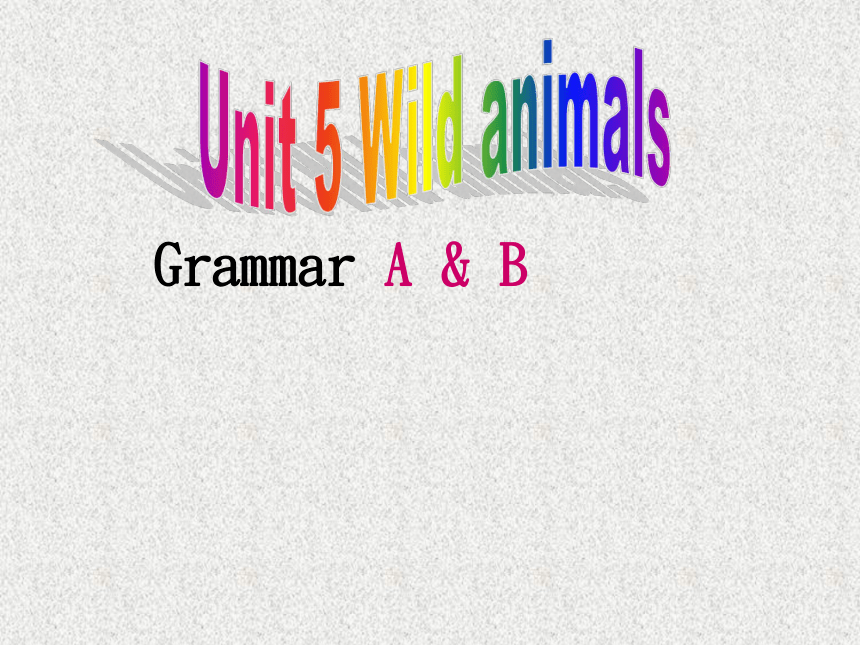 | |
| 格式 | zip | ||
| 文件大小 | 295.0KB | ||
| 资源类型 | 教案 | ||
| 版本资源 | 牛津译林版 | ||
| 科目 | 英语 | ||
| 更新时间 | 2018-01-23 14:02:45 | ||
图片预览


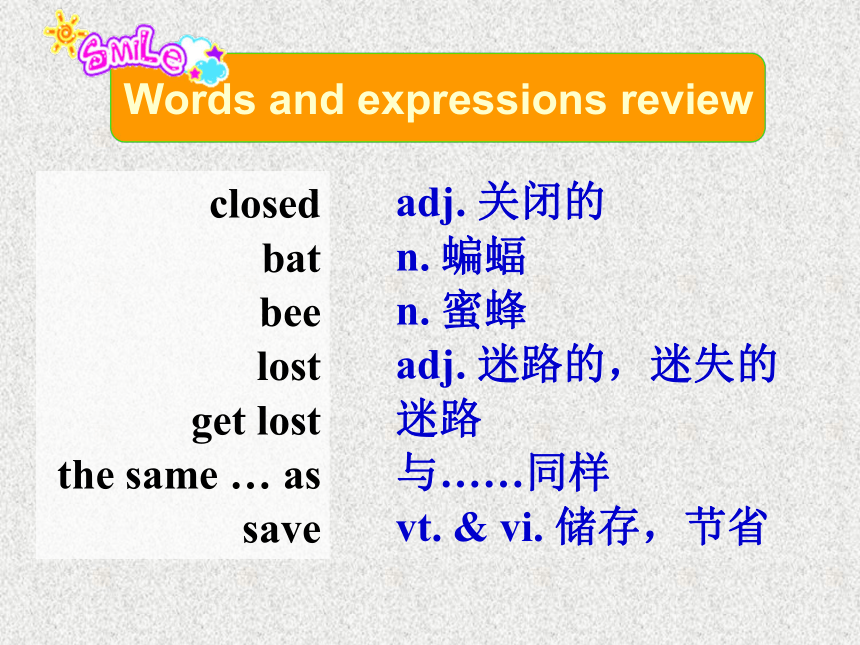
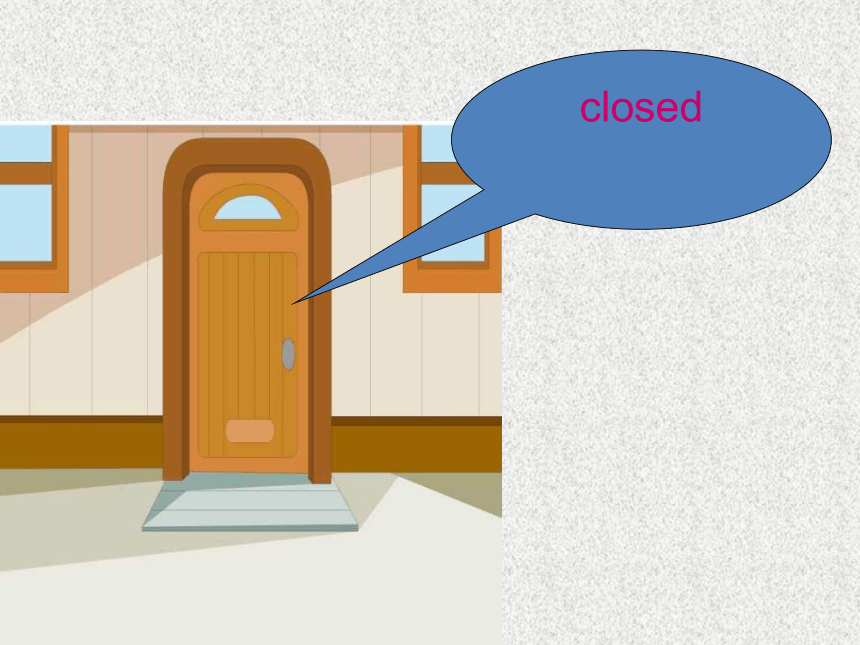
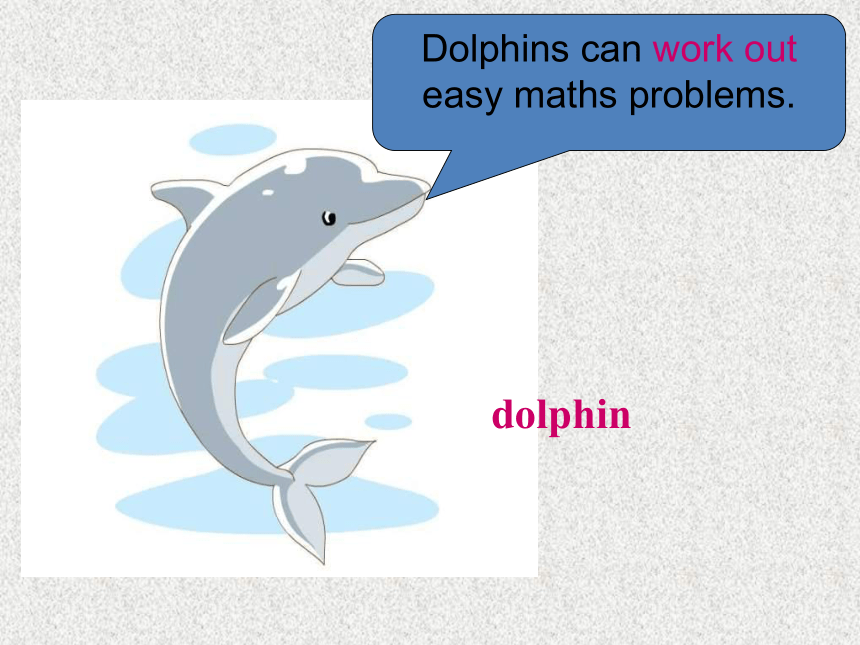
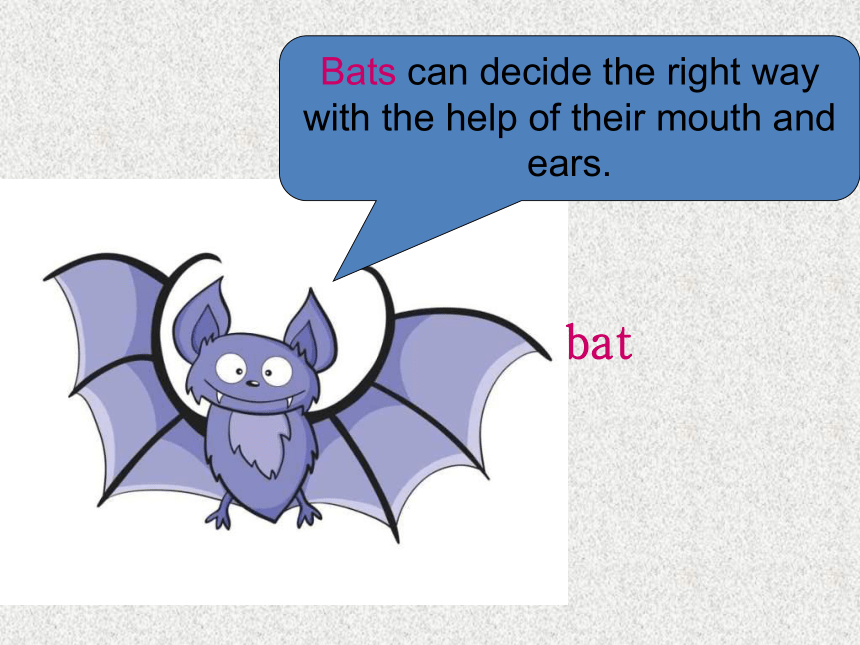
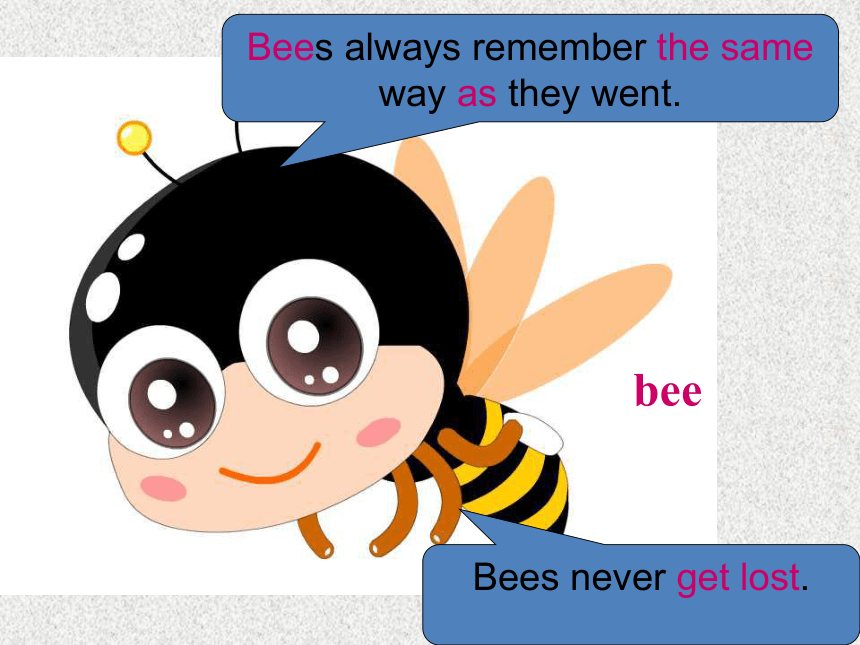
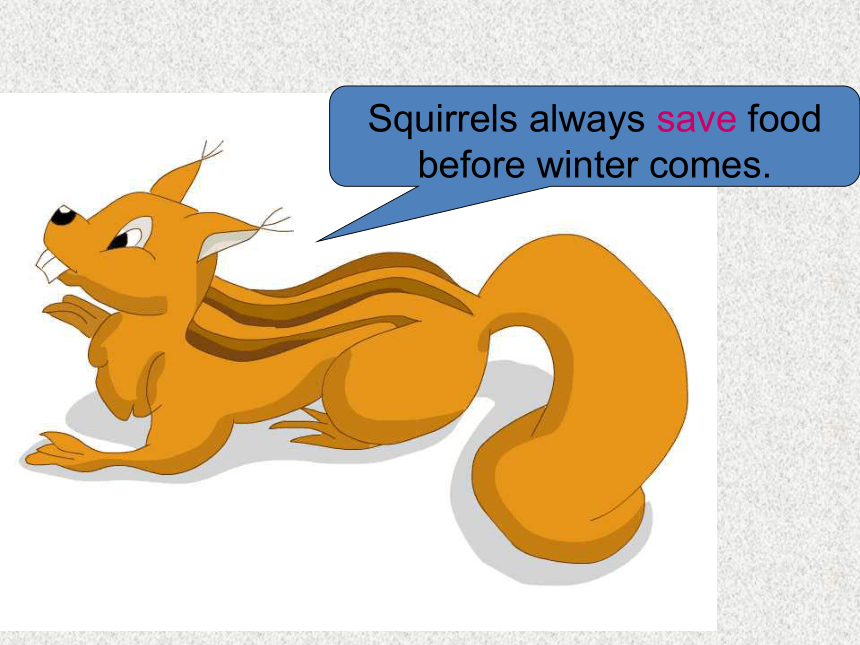
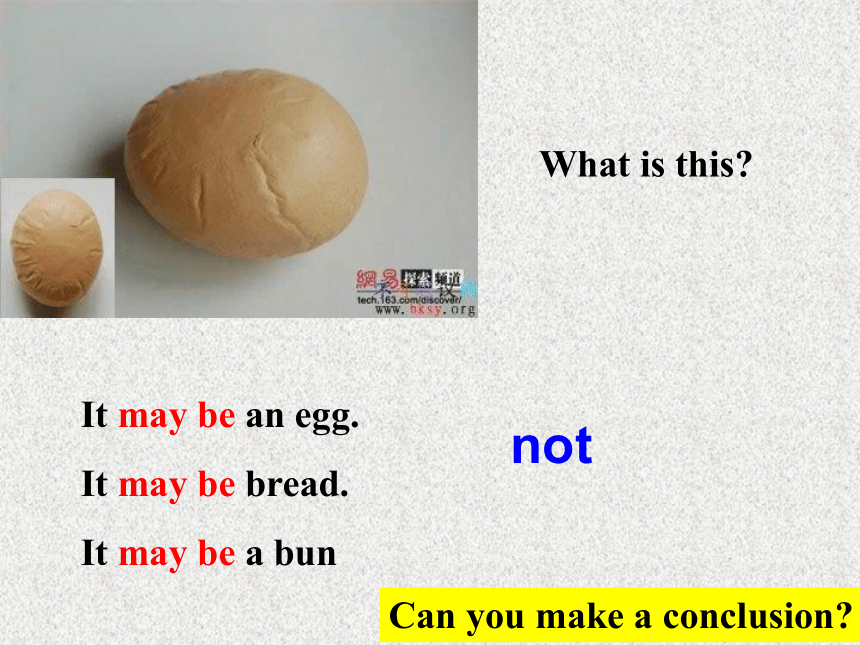
文档简介
课件29张PPT。Unit 5 Wild animalsGrammar A & B
教学目标:
1.掌握并能正确使用may 来表示可能性。
2.掌握并正确使用动词不定式。
3. 了解更多有关野生动物的信息。closed
bat
bee
lost
get lost
the same … as
saveadj. 关闭的
n. 蝙蝠
n. 蜜蜂
adj. 迷路的,迷失的
迷路
与……同样
vt. & vi. 储存,节省closedDolphins can work out easy maths problems.dolphinBats can decide the right way with the help of their mouth and ears.batBees never get lost.Bees always remember the same way as they went.beeSquirrels always save food before winter comes.What is this?It may be an egg.
It may be bread.
It may be a bunnotCan you make a conclusion?What is this?--- May it be a cow?
---Yes, it may be.
No, it may not be. --- What may it be?
--- It may be a horse.Can you make a conclusion?What do you think of the frog?It may die.
It may sleep.
It may have a rest.do notCan you make a conclusion?What are the two cocks doing?They may be playing football.
They may be fighting with each other.Can you make a conclusion?GrammarⅠ情态动词 may
Using may to say that something is possible.
may 表示推测,译为“可能”,后跟动词原形,
即:may do sth. “可能做某事”2.否定式:may not do sth. “可能不做某事”3.表示“可能”时,常用于肯定句和否定句。4. may 也可以表示许可,译为“可以,能”, 常用在疑问句中。
--- May I use your mobile phone?
--- Of course you may.
--- May I ask you a question?
--- Yes, please.
--- May I come in, Mr Wu?
--- No, you may not.
--- May I have a talk with Millie?We use may to ask for permission(许可).
Millie?is?in?the?zoo.?She?is?telling?Sandy?on?the?phone?
about?what?happens. Complete?what?Millie?says?using
may?with?the?words?in?brackets. 1. The?elephant?is?going?towards?the?water. It?__________(need)?a?bath. 2.The?little?boy?is?crying?because?he?saw?the?tigers. He?__________(be)?afraid?of?them. 3. I?cannot?go?near?the?lions?and?tigers. They?___________(hurt)?me. 4.The?baby?panda?is?not?drinking?its?mums?milk. It?____________(not?be)?hungry. 5. The?monkeys?are?jumping?around. They?_______________(be?playing)?with?each?other. 6. The?horse?is?standing?with?its?eyes?closed. It?_________________(be?sleeping). may needmay bemay hurtmay not bemay be playingmay be sleeping1. Kitty计划带Linda出去。
Kitty plans to take Linda out.
2. Linda想去参观公园。
Linda wanted to visit the park.
3. Sandy同意和他们一起去。
Sandy agreed to go with them.
4. Millie决定留在家里。
Millie decided to stay at home.Put the following sentences into English.
不计划
计划不Can you find out the rule?1. Kitty plans to take Linda out.
2. Linda wanted to visit the park.
3. Sandy agreed to go with them.
4. Millie decided to stay at home.not动词不定式作宾语 Using verbs + ‘to’-infinitives1.动词不定式的形式:to do2. 否定式:not to do3. 常跟动词不定式的动词有:agree/ choose/ decide/ forget/ hope/learn/like/ plan/ prepare/promise/ refuse/ remember/ seem/ want/ wish/ would like + to do
(1)We hope to get there before dark.
(2)The girl decided to do it herself.
not动词不定式作宾语的注意事项1. 有些动词既可跟不定式作宾语, 也可 跟动名词作宾语,但含义不同:
remember to do sth 记住要做某事;
remember doing sth 记得曾经做过某事
forget to do sth 忘记要做某事
forget doing sth 忘记曾经做过某事课堂检测1. I _________ more fruit and vegetables
every day. (plan; eat)
2. After dinner, we ___________ TV and
chat there. (like; watch)
3. I _________ there and look out at the
beach and the sea. (love; sit)
4. I ___________ sick people. (want; help)
5. I _____________ the violin at the age of
six. (start; play)plan to eatlike to watchlove to sitwant to helpstarted to play6. I ____ die without them.
7. At four months old, she weighed about
eight kilograms and ____________
outside for the first time.
8. When she was six months old, she
___________ bamboo.
9. When she was 20 months old, she
____________ after herself.
10. As a result, pandas ________ have a
place to live or food to eat.
11. If we do nothing, soon there ____ be
none left!maystarted to gobegan to eatlearnt to lookmay notmay1. — Don’t forget ______ your homework,
John.
— Ok, I’ll do it right now.
A. doing B. do C. to do
2. — Have you decided which senior high
school to choose?
— Not yet. I ______ go to Moonlight
School.
A. must B. may
C. need D. shouldI. 单项选择。3.Peter?______ come?with?us?tonight,?
but?he?isn't?very?sure?yet. A.?must?? B.?may? C.?can D.?will
4.— Are you ready for the trip to the
amusement park?
— We decide ______ to an amusement
park. We will go climbing.
A. to go B. not go
C. don’t go D. not to go 5. — Is Jim coming by train?
— I’m not sure. He ______ drive his car.
A. must B. may C. need
6. Drivers should remember not ______
after drinking, or they will break the
law.
A. drive B. driving
C. to drive D. to be drivenMore about wild animals
Amy's dad is asking Amy some questions about animals. Complete their conversation with the words in brackets.
Dad: Do you know anything special about wild animals?
Amy: Yes, Dad. For example, dolphins are clever. They
can_(1)._________________ (learn, work out) easy
maths problems.
Dad: What do you know about bats?
Amy: Rats can't see, hut they can⑵ ______________
(decide, fly) the right way with the help of their
mouth and ears.learn to work outdecide to flyDad: Did you know that bees never get lost?
Amy: Yes. Bees always (3)______________________
(remember, come back)
the same way as they went.
Dad: What do you know about squirrels?
Amy: They always _(4)_____________(begin, save) some food before winter comes.
Dad: Yes, but sometimes they forget where to find the food.remember to come backbegin to saveII. 完成句子。1. 他可能认识你。
He _________ you. 2. 他们可能下周去长城。
They _________ the Great Wall next week.
3. 我们同意马上离开。
We agreed ________ at once.
4. Laura计划到中国一些名胜之地旅游。
Laura ____________ some places of
interest in China.
5. 你愿意和他一起工作吗?
Would you _____________ with him? like to work plans to visitto leavemay knowmay go toHomework 写一篇介绍熊猫的短文,尽可能多得用上
may或could表示可能性。
教学目标:
1.掌握并能正确使用may 来表示可能性。
2.掌握并正确使用动词不定式。
3. 了解更多有关野生动物的信息。closed
bat
bee
lost
get lost
the same … as
saveadj. 关闭的
n. 蝙蝠
n. 蜜蜂
adj. 迷路的,迷失的
迷路
与……同样
vt. & vi. 储存,节省closedDolphins can work out easy maths problems.dolphinBats can decide the right way with the help of their mouth and ears.batBees never get lost.Bees always remember the same way as they went.beeSquirrels always save food before winter comes.What is this?It may be an egg.
It may be bread.
It may be a bunnotCan you make a conclusion?What is this?--- May it be a cow?
---Yes, it may be.
No, it may not be. --- What may it be?
--- It may be a horse.Can you make a conclusion?What do you think of the frog?It may die.
It may sleep.
It may have a rest.do notCan you make a conclusion?What are the two cocks doing?They may be playing football.
They may be fighting with each other.Can you make a conclusion?GrammarⅠ情态动词 may
Using may to say that something is possible.
may 表示推测,译为“可能”,后跟动词原形,
即:may do sth. “可能做某事”2.否定式:may not do sth. “可能不做某事”3.表示“可能”时,常用于肯定句和否定句。4. may 也可以表示许可,译为“可以,能”, 常用在疑问句中。
--- May I use your mobile phone?
--- Of course you may.
--- May I ask you a question?
--- Yes, please.
--- May I come in, Mr Wu?
--- No, you may not.
--- May I have a talk with Millie?We use may to ask for permission(许可).
Millie?is?in?the?zoo.?She?is?telling?Sandy?on?the?phone?
about?what?happens. Complete?what?Millie?says?using
may?with?the?words?in?brackets. 1. The?elephant?is?going?towards?the?water. It?__________(need)?a?bath. 2.The?little?boy?is?crying?because?he?saw?the?tigers. He?__________(be)?afraid?of?them. 3. I?cannot?go?near?the?lions?and?tigers. They?___________(hurt)?me. 4.The?baby?panda?is?not?drinking?its?mums?milk. It?____________(not?be)?hungry. 5. The?monkeys?are?jumping?around. They?_______________(be?playing)?with?each?other. 6. The?horse?is?standing?with?its?eyes?closed. It?_________________(be?sleeping). may needmay bemay hurtmay not bemay be playingmay be sleeping1. Kitty计划带Linda出去。
Kitty plans to take Linda out.
2. Linda想去参观公园。
Linda wanted to visit the park.
3. Sandy同意和他们一起去。
Sandy agreed to go with them.
4. Millie决定留在家里。
Millie decided to stay at home.Put the following sentences into English.
不计划
计划不Can you find out the rule?1. Kitty plans to take Linda out.
2. Linda wanted to visit the park.
3. Sandy agreed to go with them.
4. Millie decided to stay at home.not动词不定式作宾语 Using verbs + ‘to’-infinitives1.动词不定式的形式:to do2. 否定式:not to do3. 常跟动词不定式的动词有:agree/ choose/ decide/ forget/ hope/learn/like/ plan/ prepare/promise/ refuse/ remember/ seem/ want/ wish/ would like + to do
(1)We hope to get there before dark.
(2)The girl decided to do it herself.
not动词不定式作宾语的注意事项1. 有些动词既可跟不定式作宾语, 也可 跟动名词作宾语,但含义不同:
remember to do sth 记住要做某事;
remember doing sth 记得曾经做过某事
forget to do sth 忘记要做某事
forget doing sth 忘记曾经做过某事课堂检测1. I _________ more fruit and vegetables
every day. (plan; eat)
2. After dinner, we ___________ TV and
chat there. (like; watch)
3. I _________ there and look out at the
beach and the sea. (love; sit)
4. I ___________ sick people. (want; help)
5. I _____________ the violin at the age of
six. (start; play)plan to eatlike to watchlove to sitwant to helpstarted to play6. I ____ die without them.
7. At four months old, she weighed about
eight kilograms and ____________
outside for the first time.
8. When she was six months old, she
___________ bamboo.
9. When she was 20 months old, she
____________ after herself.
10. As a result, pandas ________ have a
place to live or food to eat.
11. If we do nothing, soon there ____ be
none left!maystarted to gobegan to eatlearnt to lookmay notmay1. — Don’t forget ______ your homework,
John.
— Ok, I’ll do it right now.
A. doing B. do C. to do
2. — Have you decided which senior high
school to choose?
— Not yet. I ______ go to Moonlight
School.
A. must B. may
C. need D. shouldI. 单项选择。3.Peter?______ come?with?us?tonight,?
but?he?isn't?very?sure?yet. A.?must?? B.?may? C.?can D.?will
4.— Are you ready for the trip to the
amusement park?
— We decide ______ to an amusement
park. We will go climbing.
A. to go B. not go
C. don’t go D. not to go 5. — Is Jim coming by train?
— I’m not sure. He ______ drive his car.
A. must B. may C. need
6. Drivers should remember not ______
after drinking, or they will break the
law.
A. drive B. driving
C. to drive D. to be drivenMore about wild animals
Amy's dad is asking Amy some questions about animals. Complete their conversation with the words in brackets.
Dad: Do you know anything special about wild animals?
Amy: Yes, Dad. For example, dolphins are clever. They
can_(1)._________________ (learn, work out) easy
maths problems.
Dad: What do you know about bats?
Amy: Rats can't see, hut they can⑵ ______________
(decide, fly) the right way with the help of their
mouth and ears.learn to work outdecide to flyDad: Did you know that bees never get lost?
Amy: Yes. Bees always (3)______________________
(remember, come back)
the same way as they went.
Dad: What do you know about squirrels?
Amy: They always _(4)_____________(begin, save) some food before winter comes.
Dad: Yes, but sometimes they forget where to find the food.remember to come backbegin to saveII. 完成句子。1. 他可能认识你。
He _________ you. 2. 他们可能下周去长城。
They _________ the Great Wall next week.
3. 我们同意马上离开。
We agreed ________ at once.
4. Laura计划到中国一些名胜之地旅游。
Laura ____________ some places of
interest in China.
5. 你愿意和他一起工作吗?
Would you _____________ with him? like to work plans to visitto leavemay knowmay go toHomework 写一篇介绍熊猫的短文,尽可能多得用上
may或could表示可能性。
